|
Unemployment Assistance
Being unemployed is never easy, and it's even harder when winter brings higher utility bills and holiday expenses. Use our
WIC Can Help
page to refer families to unemployment resources, including family leave assistance.
|
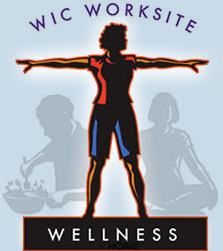
Diet Tracking Apps Effective?
|
Shopping at Amazon?
Support CWA without spending anything extra by using
AmazonSmile!
|
Did someone share this with you? Sign up here to get the CWA Flash directly!
|
|
|

Happy New Year? Can Congress Deliver?
As Congress returns for the 2018 session, constituents are tuning back in to the news, many having taken a short break themselves. A government shutdown was averted on Dec. 21, with a
Continuing Resolution to extend funding to Jan. 19. For WIC this keeps funding basically at FY17 funding levels. In upcoming funding decisions, key issues of interest to young low-income families include funding bills for programs that support food access, health care and social supports. Tied to ongoing national
funding discussions are numerous immigration issues, particularly the bargaining that puts
DACA participants future at risk.
Children who receive health insurance through the CHIP program are increasingly at risk of losing coverage, since state programs and health plans,
including CA
, must plan for loss of coverage or find more state funding to fill the gap.
|

Adult Denti-Cal Benefits Restored!
As of the first of the year, adults with full-scope Medi-Cal now have fully restored benefits through Denti-Cal! This includes all pregnant women, regardless of immigration status, who are eligible for pregnancy-related Medi-Cal with full benefits. Adult dental benefits were drastically cut in 2009 due to a state budget crisis, and then partially restored in 2014. Lack of access to adequate dental care had lasting effects on the health and well-being of millions of Californians. To remedy this,
CPEHN and partners
launched a campaign last year to fully restore these benefits. Thanks to legislative leaders and Governor Brown, the 2017-2018 Budget included the full restoration of adult dental benefits. Thank you to the champions in the California State Legislature and members of our community who contributed to this key oral health victory! Check here for a consumer pamphlet in
English
and
Spanish
with more information about the restored dental benefits and how to access them. Adults with full-scope Medi-Cal can expect to receive a letter in the mail notifying them of these new benefits.
|
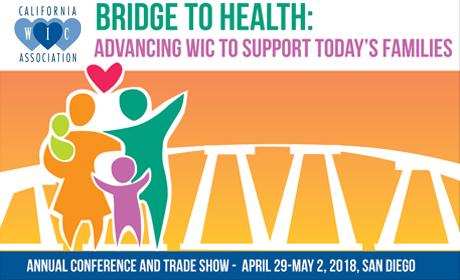
Annual Conference 2018: Early Bird Registration!
We look forward to seeing you in San Diego, April 29 - May 2 for our annual conference,
Bridge to Health: Advancing WIC to Support Today's Families
! You can expect inspiring plenary sessions, a full trade show, relevant local agency sharing exhibits, a thought-provoking movie night, and five concurrent tracks of stimulating workshops.
ACTION:
Register!
Early bird discounts run through Feb. 23rd. Consider what best practice you'll educate your peers about at the local agency sharing table - check the
conference page
for applications soon!
|
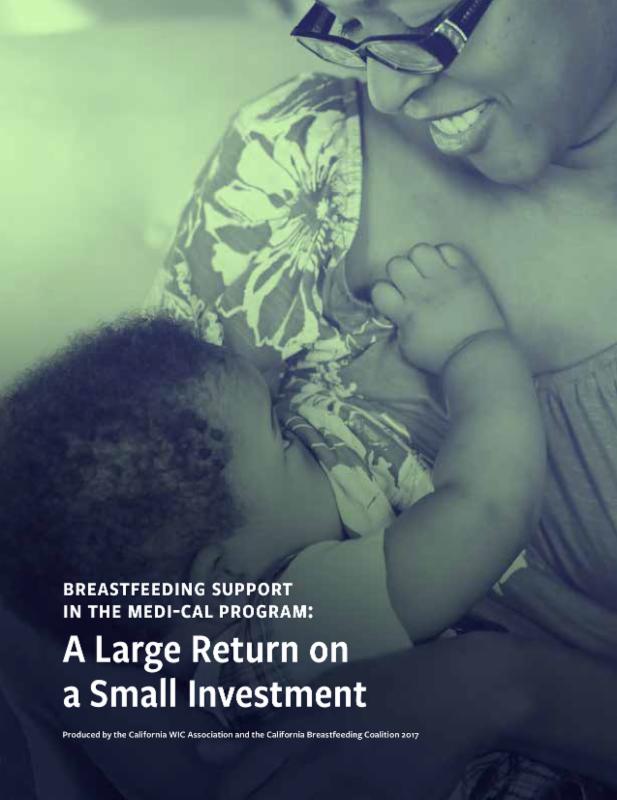
Breastfeeding Actuarial Analysis-NEW Report!
Since the passage of the Affordable Care Act, women have been frustrated that the required provision of breastfeeding support has not been reliably available in both commercial and public health plans. For California WIC moms, a majority of whom have Medi-Cal health plans, they turn to WIC when their health plan does not provide counseling and support and/or effective breast pumps and supplies. Research supports the positive health outcomes of breastfeeding, which translates to saved healthcare costs. California WIC Association and California Breastfeeding Coalition are pleased to release Breastfeeding Support in the Medi-Cal Program: A Large Return on a Small Investment. This actuarial analysis examines the cost to health plans (very low per member per year) providing this support and projected cost savings!
|
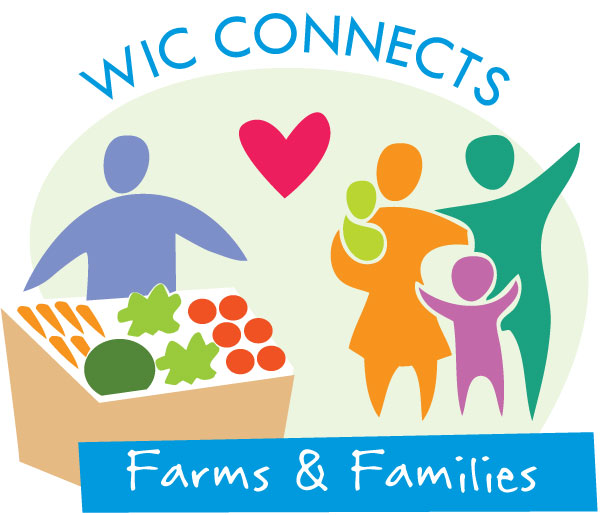
Farm2WIC Training Opportunities
Do your local farmers' markets accept WIC's monthly Fruit and Vegetable Checks (CVV) in addition to the seasonal FMNP checks? Find out here. If they don't, they are missing an opportunity to expand their customer base! With free training from the State WIC Program, they can get authorized to accept all WIC fruit/vegetable benefits. This gives WIC families a fresh, local, often year-round shopping option, too. ACTION: Tell your local market managers or growers about upcoming trainings to become authorized to accept WIC checks. Visit our Farm2WIC webpage for more info, dates and locations of upcoming trainings, and free resources for local WIC agencies and market managers & vendors.
|

Nursing Mother's Diet May Protect Against Allergies
Research indicates that a mother's diet can protect nursing newborns against food allergies. In mice, milk from mothers exposed to egg protein gave protection against egg allergy not only to the mothers' own offspring, but also to fostered newborns whose birth mothers had not received egg. The protective effect was strongest when newborns were nursed by their mothers who were exposed to egg before and during pregnancy and breastfeeding. The study's findings are consistent with new dietary recommendations for pregnant and nursing mothers. Previous research had not been conclusive, with some studies indicating a protective role for breast milk, and others suggesting that children could become allergic to foods they encountered through their mother's diet. Pregnant and breastfeeding mothers were sometimes cautioned against consuming foods that commonly cause allergy, such as milk, egg, peanut, tree nuts, soy, wheat, fish and shellfish. More recently, feeding peanut foods to infants at high risk for peanut allergy was shown to decrease, not increase, the babies' likelihood of developing allergy to peanut. Allergists now recommend that, unless mothers already have diagnosed food allergies, they should not avoid allergenic foods while pregnant and nursing.
|

Healthy Eating Linked to Kids' Happiness
Children who are healthy eaters are more likely to have better self-esteem and fewer emotional and peer problems, regardless of body weight or socioeconomic status, according to a recent
study in BMC Public Health
. Conversely, better self-esteem is associated with better adherence to healthy eating guidelines. Examining 7,675 children two to nine years of age from eight European countries, researchers found that a higher Healthy Dietary Adherence Score (HDAS) - which measures things like intake of refined sugars, fat, and produce - at the beginning of the study period was associated with better self-esteem and fewer emotional and peer problems two years later.
|

Stressed Newborns Feel More Pain, Don't Show It
When newborn babies are under stress, their brains show a heightened response to pain, a new study has found. However, you'd never know it from the way those infants act - findings show that stress leads to an apparent disconnect between babies' brain activity and their behavior. Researchers note that when newborn babies experience a painful procedure, there is a coordinated increase in their brain activity and their behavioral responses, such as crying and grimacing. Babies who are stressed have an even larger response in the brain, but the greater brain activity is no longer matched by their behavior. Authors of the study say that the findings offer yet another reason to treat and care for babies in ways that minimize both pain and stress. Stressed babies may not seem to respond to pain, even as their brain is still processing it.
|
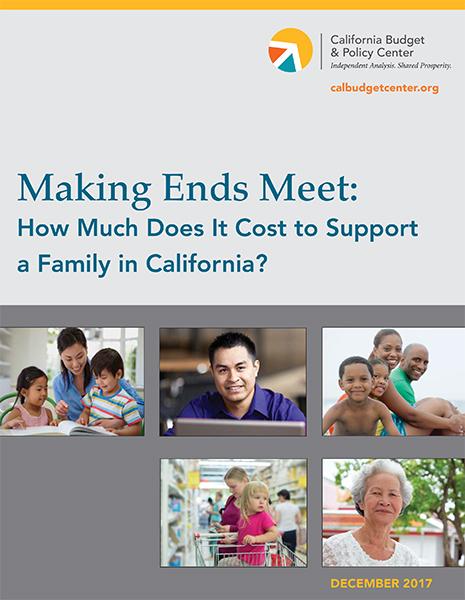
California Living
The California Budget Center's recently released major analysis, Making Ends Meet: How Much Does It Cost to Support a Family in California? sheds light on the economic challenges faced by many Californians, especially given the high cost of living in various parts of our state. Making Ends Meet features figures for all 58 California counties on what it takes to afford a basic budget for different household types. For instance, Making Ends Meet shows that for a family of four with two working parents, a basic annual family budget ranges from a high of $110,984 in San Francisco County to a low of $55,032 in Modoc County.
|
Birth & Maternal Health Resource Book
MomsRising has
shared their new Birth & Maternal Health Resource Book
. It's for partners, legislators and everyday folks who want to learn more about the problematic state of maternal morbidity/mortality in our nation. The book also serves as an advocacy tool to champion policies and solutions that can address the increasing maternal mortality and morbidity rates in the U.S. along with overt racial disparities in maternal health outcomes. This
Resource & Story book
contains: member stories from almost every state, maternal health statistics, infographics and policy recommendations, and articles on topics related to maternal health/mortality/morbidity and birth. Share your thoughts, or see what others are saying on social media using #MaternalJustice.
|
Food Insecurity in the United States
The Academy of Nutrition and Dietetics has published a position paper on food insecurity in the United States, asserting that systematic and sustained action is needed to achieve food and nutrition security in the United States. The Academy believes that to achieve food security, effective interventions are needed, along with adequate funding for, and increased utilization of, food and nutrition assistance programs; inclusion of nutrition education in such programs; strategies to support individual and household economic stability; and research to measure impact on food insecurity- and health related outcomes. Read the
full paper here
.
|
mPINC Survey Public Comment Opportunity
The Centers for Disease Control and Prevention have released a
public comment opportunity
to collect feedback on proposed updates to the Maternity Practices in Infant Nutrition and Care (mPINC) Survey. The 2018 and 2020 mPINC surveys will closely match previous iterations in methodology and administration but CDC updated the content of the survey to reflect changes in maternity care over time. This is the first significant revision to the mPINC survey since its initial launch in 2007. ACTION: Comments must be submitted on or before Monday, January 22.
|
Don't Bring Zika Home
Californians, particularly pregnant women residing in the state, are at risk of contracting the Zika virus, which could have devastating impacts on a developing baby. The highest risk is attributable to women traveling to countries where the Zika virus is being transmitted locally by the Aedes agypti mosquito and sexual transmission. While pregnant women are most at risk, other travelers, especially those of childbearing age, are also at risk of contracting the virus and passing it to others through sexual transmission. Learn more about the virus, transmission and prevention. ACTION: Check out the extensive materials including this PSA provided by the CA Dept. of Public Health.
|
|
|